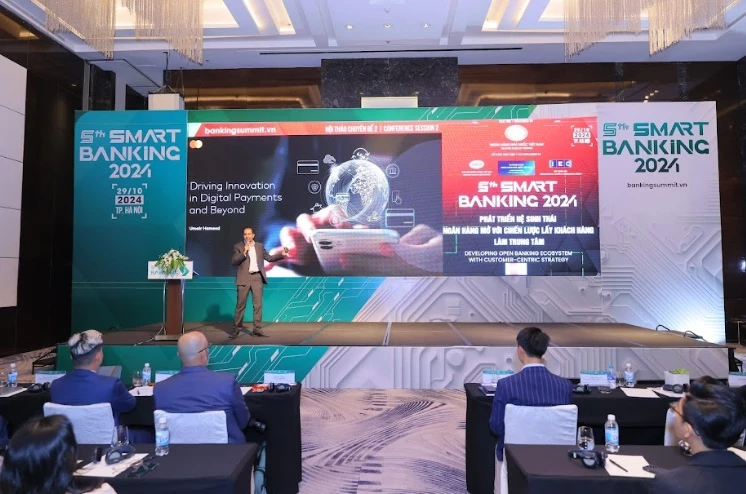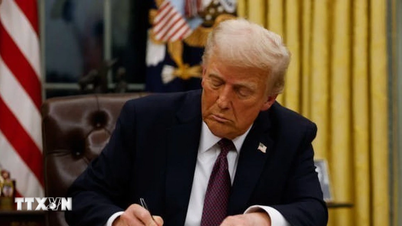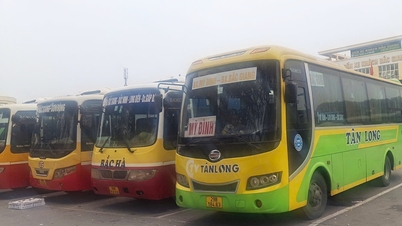DNVN - At the Smart Banking 2024 conference and exhibition held in Hanoi on October 29, the topic of Open Banking was explored from a practical perspective with the participation of representatives of the State Bank, representatives of the Ministry of Public Security, Ministry of Finance, Ministry of Information and Communications... and experts in the fields of finance and technology.
The key to promoting open banking platforms
According to experts, currently in the world, open banking is the first platform for people to start applying basic banking services such as opening accounts and issuing cards. However, open banking is developing further with open finance, which not only provides financial services but also expands to other services in the ecosystem, or in other words, connects with other entities in the financial sector such as insurance companies... From there, businesses can provide customers with better choices for financial management. And finally, towards an open economy, which means linking finance and non-finance.
At the event, Mastercard representatives shared about three fundamental factors to move towards open banking and further open finance and open economy.
First, the architecture. Every open banking platform must have detailed terms, regulations, and standards for data, such as what data must be shared, what data is encouraged to be shared, and what data is open to participants. Such a set of standards will help participants come up with appropriate strategies for implementation.

Experts discuss at the event.
Next is user rights. Open banking is all about empowering users, and users need to understand how they are empowered. However, a UK study found that nearly 60% of users did not fully understand their rights after 5 years of implementing open banking. This highlights the importance of raising awareness and engaging with users so they understand their rights.
Finally, the strategy of the participants. Banks can choose to participate passively by complying with the regulations on open banking, or actively participate in building and see it as a strategy to create new surplus values for the business.
These three factors will determine the implementation of open banking by businesses as well as move closer to open finance and open economy.
The future of digital payments
In today’s digital economy, the concept of money and the way value is exchanged is changing profoundly. In addition to traditional cash and bank balances, digital currencies such as central bank digital currencies (CBDCs), carbon credits, and cryptoassets such as NFTs are increasingly being used. This shift reflects the importance of digital assets, with 94% of central banks worldwide exploring or developing CBDCs to accommodate online commerce.
Attending the session “Developing an open banking ecosystem with a customer-centric strategy”, Mastercard representatives shared in-depth knowledge and experience on “Driving innovation in digital payments and beyond”.
In the context of digital transformation of assets, new technologies also allow assets, from real estate to personal items, to be tokenized in digital form and easily exchanged. The total value of crypto assets globally is expected to reach nearly $4 trillion by 2030. Therefore, financial institutions now need to provide secure storage and exchange services for digital assets in a tightly regulated environment.
At the same time, challenges in traditional payments, such as dependence on mobile devices, online payment authentication... will gradually be improved with biometric technology and integrated payments, allowing devices and vehicles to automatically make transactions, towards a future of faster and more convenient transactions, even vehicles, automatically making payments. This transformation will meet consumer demand for fast, convenient transactions, and fundamentally change the way we perceive and manage value in the digital age.

Mastercard representatives discuss the future of digital payments.
The trend of service personalization and its impact on customer experience thanks to open banking platforms
“Open banking” is a concept that goes against the traditionally siloed nature of banking. Initially, the banking industry was hesitant to embrace open banking, but then European regulations required more transparency and data sharing, which brought both challenges and new opportunities to the banking and finance industry.
According to Mastercard, when approaching “open banking”, banks initially faced risks when sharing customer data, which could even increase customer churn. However, the competition that open banking brings is beneficial to consumers, making it easier for them to compare services between parties, motivating financial institutions to improve service quality. For certain groups of customers, especially those in need of credit, open banking can make it easier for them to use services by allowing for broader data sharing for credit assessment. This approach is gradually developing and banks are gradually seeing this as an opportunity to improve the customer experience.
In Vietnam, to realize the potential of open banking, collaboration beyond banks is needed, including the government and financial platforms to build a cohesive ecosystem. Despite many challenges, clear case studies and strong partnerships will be key to driving this development.
The Role of AI in Enhancing Safety and Security in Digital Payments
At the session "Improving safety and security in the era of digital banking transformation", the roundtable discussion with the participation of representatives from Mastercard, IBM, Samsung Vina, Techcombank, Lenovo Vietnam, Hackuity and Sophos revealed in-depth solutions contributing to improving the safety and security of online transactions in the digital age.
Mastercard representatives also shared their opinions on the importance of emerging technologies such as AI for safety and security in the digital age from the perspective and experience of a world-leading technology company in the payment field.
AI stories, from Reactive AI, Generative AI to Physical AI, are a hot topic. As a payments technology company, Mastercard focuses on using AI to ensure and enhance system security and safety. This is one of Mastercard's top priorities.
In fact, it is very difficult for humans to keep up with AI in processing large amounts of data in a certain period of time. This is considered a major threat to the security and safety of the digital economy. However, businesses can absolutely use AI to build protective measures to keep operating systems safer.
Globally, Mastercard has been leveraging the power of AI for more than a decade to protect customers from fraud without compromising the user experience. Mastercard owns the Mastercard Decision Intelligence solution, through which all transactions occurring within the Mastercard network are evaluated. Mastercard has been applying AI technology to protect more than 143 billion transactions each year. At the same time, Mastercard also continuously improves technology and solutions, not only applying new technology but also optimizing current technology.
Mastercard will soon launch Mastercard Decision Intelligence Pro, a GenAI-powered solution that filters financial data and tracks transactions. Last September, Mastercard also invested $2.6 billion to expand its cybersecurity offerings by acquiring Recorded Future, a global threat intelligence company. This is a concrete example of AI being used to ensure security in the payments industry.
Beyond cybersecurity, Mastercard’s AI-powered technological advancements are also providing solutions to next-generation problems. These solutions empower consumers through advanced digital tools that support the AI customer journey, including personalization, digital identity, next-generation retail experiences, and intelligent, self-learning multi-modal payment networks. The biggest challenge with AI is understanding customers better. Expanding customer data sets through better technology will help businesses understand customer spending trends in certain locations, thereby ensuring a seamless customer payment experience.
Hoang Phuong
Source: https://doanhnghiepvn.vn/kinh-te/tai-chinh-ngan-hang/ngan-hang-mo-va-tri-tue-nhan-tao-tuong-lai-cua-nganh-tai-chinh-ngan-hang/20241030084642872


![[Photo] "Lovely" moments on the 30/4 holiday](https://vphoto.vietnam.vn/thumb/1200x675/vietnam/resource/IMAGE/2025/5/1/26d5d698f36b498287397db9e2f9d16c)

![[Photo] Ha Giang: Many key projects under construction during the holiday season](https://vphoto.vietnam.vn/thumb/1200x675/vietnam/resource/IMAGE/2025/5/1/8b8d87a9bd9b4d279bf5c1f71c030dec)


![[Photo] Binh Thuan organizes many special festivals on the occasion of April 30 and May 1](https://vphoto.vietnam.vn/thumb/1200x675/vietnam/resource/IMAGE/2025/5/1/5180af1d979642468ef6a3a9755d8d51)





























































































Comment (0)